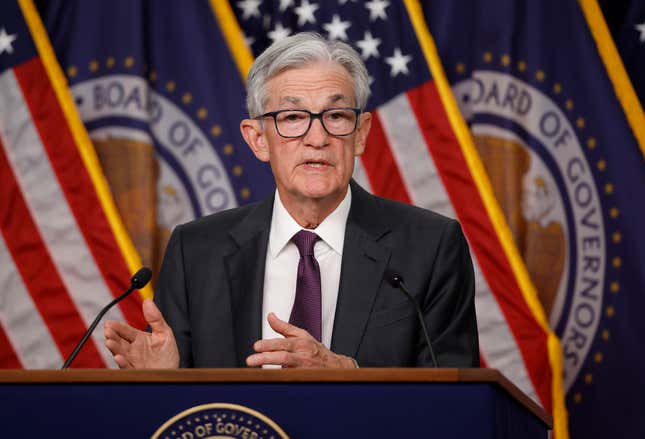
In This Story
Federal Reserve Chairman Jerome Powell said Friday that he expects President Donald Trump’s tariffs to raise inflation but that the central bank won’t move to change interest rates until it has a better picture of the impact.
“It is now becoming clear that tariff increases will be significantly larger than expected, and the same is likely to be true of the economic effects, which will include higher inflation and slower growth,” Powell said at the Society for Advancing Business Editing and Writing conference. “The size and duration of these effects remain uncertain.”
The Trump administration has set “reciprocal” tariff rates at about half of what it says other countries levy on American imports and imposed a 10% base tariff on almost all nations. After all the tariffs take effect next week, importers, who are responsible for the levies, will pay much more for most goods. The U.S. has also enacted other tariffs this year, with additional hikes likely on the way.
Some major U.S. trade partners have been hit with tariff rates far above the 10% minimum, which has already brought retaliation from China. Vietnam, hit with a 46% tariff, is in active negotiations with the Trump administration to cut the U.S. tariffs, according to Trump.
The sweeping new tariffs are likely to cause inflation and slow economic growth, according to economists. Multiple analysts, including J.P. Morgan, have said the risk of a recession has also increased.
The Fed won’t be making any changes to interest rates until early May when the next Federal Open Market Committee meeting is scheduled. In a statement posted to his Truth Social ahead of Powell’s conference appearance, Trump called for the Fed to slash interest rates, pointing to inflation, which slowed by more than expected in February.
“CUT INTEREST RATES, JEROME, AND STOP PLAYING POLITICS!” Trump added.
Powell, who has frequently defended the independence of the Fed, said it’s not the bank’s responsibility to comment on the Trump administration’s policies. He also emphasized that it will be “very difficult” to understand the likely economic effects of the tariffs until there is more certainty of what duties will stick around.
“Economic events are just very, very unpredictable at times, and there are shocks that you can’t see coming,” Powell said. “Our job is to, whatever happens, use our tools to bring the economy back to stability, back to price stability, back to maximum employment.”
“We don’t need to be in a hurry” to make decisions on monetary policy, he added. “We’re going to need to wait and see how this plays out.”
Economists are split between those who expect policymakers to focus on prices and therefore keep interest rates on hold for an extended period — and those who think the central bank will prioritize full employment and start to cut borrowing costs.
Citi (C) said this week in a note to clients that officials will likely view an increase in inflation caused by tariffs as a one-time increase “that can be looked through,” adding that it expects 125 basis points of cuts this year. On the other hand, Jeffries (JEF) analysts think Powell and his board will be “leaning more towards hiking than anything else.”
“Our textbooks tell us that tariffs are inflationary if the currency market does not adjust to offset,” the bank’s W. Brad Bechtel wrote earlier this week. “The USD dropping 2% amid the addition of tariffs around the world on U.S. imported goods, is very inflationary.”
—Josh Fellman contributed to this article.